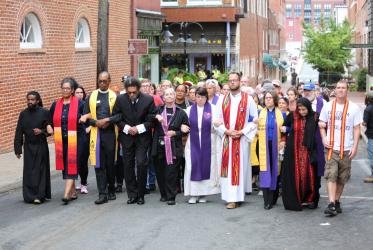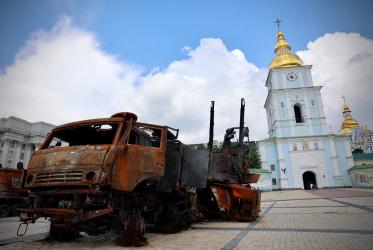The event was second in a series of regional webinars organised by the World Council of Churches (WCC) Commission of the Churches on International Affairs in collaboration with WCC Spiritual Life. It was part of many virtual events organised this year to mark the 75th anniversary of the WCC Commission of the Churches on International Affairs.
WCC deputy general secretary Prof. Dr Isabel Apawo Phiri moderated the discussion and asked a key question: “What are the lessons from these tragedies, and how do we ensure that the future generations learn from the past, ensuring that history will not be repeated?”
Phiri noted that so many of the stories shared during the webinar had either been forgotten, or that the world has suffered a kind of amnesia. “This event is a conversation, not a presentation of papers or a lecture,” she reminded the audience. “It will be a short remembering and honoring.”
Francis Muroki spoke of the Lari massacre in Kenya in the context of Kenya’s liberation struggle and fight for independence in the early 1950s. “The name Lari is a small village in the central part of Kenya, and Lari is on the route to the Aberdare Forest,” explained Muroki. “This is a massacre which led to the death of more than 5,000 people.”
“The punitive expedition in Benin was actually a British massacre in reaction to another massacre that the Kingdom of Benin, in actual Nigeria, committed against the British delegation sent to Benin in order to control palm oil trade” mentioned Clémence Evelyne Fassinou.
Rev. Dr Nagaju Muke from Rwanda reflected on the 1994 genocide perpetrated against the Tutsi.
“The colonizers created ethnic identities to deliberately divide Rwandans,” said Muke. "This led to different forms of structural violence.”
Rev. Dr Frank Chikane, from South Africa, expressed appreciation for being able to share a platform with brothers and sisters speaking from different experiences yet sharing a sense of grief.
Chikane focused on the Sharpeville massacre in which police fired on a crowd of Black people, killing or wounding some 250 of them in one of the first and most violent demonstrations against apartheid in South Africa.
"Many people always say the Afrikaners are responsible for apartheid,” he said. “I always say the English laid the platform—87% of the land was made part of what is called white South Africa.”
Father Michael, who is from South Africa and is an expert on healing of memories, said he felt “overwhelmed by the depth and the scale of pain heard from across our mother continent.”
Father Michael talked about the importance and power of acknowledgment, the importance of saying, “yes, these things happened; yes, it was true—and it was wrong.”
In order to restore moral order, he added, it’s important to consider who is telling the story. “The survivors, the relatives, the descendants are the ones most qualified to tell the story,” he said.








